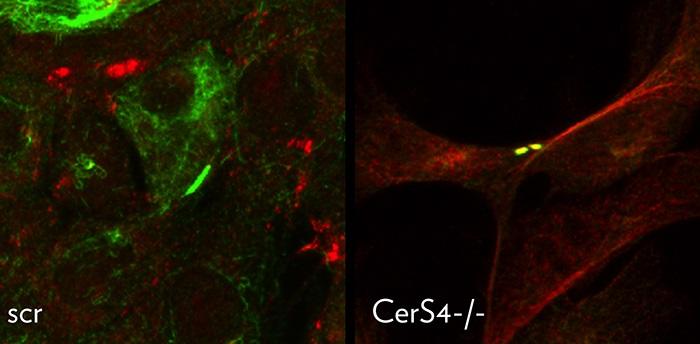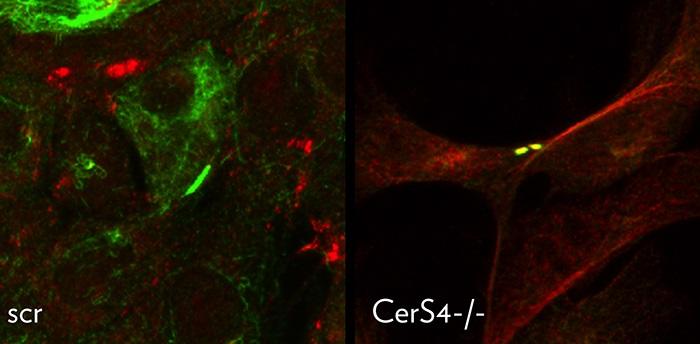
Credit: Image courtesy of Dr. Besim Ogretmen, Medical University of South Carolina. Results published in Oct. 24, 2017 issue of Science Signaling.
Understanding how cancer cells are able to metastasize — migrate from the primary tumor to distant sites in the body — and developing therapies to inhibit this process are the focus of many laboratories around the country. Researchers at the Medical University of South Carolina (MUSC) have identified one mechanism that regulates signaling events leading to cell migration and metastasis. In the October 24, 2017 issue of Science Signaling, they showed that primary cilia act as a focal point to transmit growth signals. Furthermore, they identified a specific ceramide species (produced by ceramide synthase 4 [CerS4]) that disrupts the ability of cells to form this focal point.
"We think this could be one way cancer cells actually migrate from one place to another to induce metastasis," says Besim Ogretmen, Ph.D., senior author for this study, director of the Developmental Cancer Therapeutics Program at the Hollings Cancer Center and professor of Biochemistry and Molecular Biology at MUSC.
The Ogretmen laboratory studies the signaling lipid ceramide and its role in many biological pathways, including cancer biology. Ceramides are made in cells by a family of six ceramide synthase enzymes. To identify how these different enzymes function, the Ogretmen laboratory generated mice that lacked each of these enzymes. Interestingly, mice lacking CerS4 had alopecia, a condition in which hair is lost from some or all parts of the body.
How does hair loss relate to cancer? It turns out that keratinocytes, or skin cells, migrate through the outer skin to maintain hair follicles. In the absence of CerS4, the keratinocytes are hyperactive and migrate too much, thereby disrupting the hair cycle. Ogretmen reasoned that, although this phenotype was unanticipated, the increased migration seen in these keratinocytes may also occur in cancer cells.
"Some unexpected phenotypes in animal models can actually lead to something very important in cancer biology that we didn't expect. In this case, hair loss told us something about cancer metastasis and how that can be regulated," says Ogretmen.
The recent findings from the Ogretmen laboratory indeed showed that ceramide affected cell migration, which is tightly controlled. When the cytokine transforming growth factor beta (TGF-beta) is sensed by the TGF-beta receptor, the receptor concentrates within the primary cilia of cells. The cell then changes the proteins it makes to allow the cell to migrate. Ceramide produced by CerS4 binds to Smad7, a cellular protein that can bind the TGF-beta receptor. The binding of ceramide to Smad7 prevents the TGF-beta receptor from concentrating in the cilia. Ultimately, ceramide prevents the cell from making the proteins necessary for migration.
Having identified a signaling pathway in cells, the researchers next wanted to determine if this pathway was important in cancer patients. The Ogretmen laboratory screened previously reported microarray data sets of several human tumor tissues (metastatic head and neck squamous cell carcinoma, melanoma, and renal cell carcinoma) and showed that, in these samples, only the levels of CerS4 were significantly decreased. Furthermore, using preclinical models, they showed that tumor cells that lost CerS4 expression had an increased incidence of metastasis to distant organs. This increased metastasis could be mitigated when the cell made more Smad7, which inhibited the TGF-beta receptor.
For many years, it was thought that the breadth of ceramide synthases present in cells represented redundant functions for this family of enzymes. This report suggests that this idea needs reframing, since only the ceramide generated from CerS4 regulates migration that is mediated by the TGF-beta receptor.
Future studies are aimed at developing a better model to study tumor development and metastasis in the context of CerS4. There is a mouse strain that develops primary mammary tumors, but those tumors do not form metastases. By decreasing the expression of CerS4 in these mice, the Ogretmen laboratory hopes to better define the way in which CerS4 regulates cell migration and metastasis. Furthermore, these mice would provide an excellent model to test novel therapies aimed at preventing metastasis.
However, there are several limitations to this approach. Targeting the TGF-beta receptor could have detrimental effects on other tissues of the body. Additionally, Bardet-Biedl syndrome is a metabolic disease in which trafficking of proteins within the cilium is blocked. Therefore, targeting the formation of the cilium could prove problematic. Together, it is critical when treating metastasis that the therapy be as specific as possible.
"Unfortunately, most cancer drugs have targets but those targets might be toxic when you inhibit them in other parts of the body. That's why I think the mechanistic studies are so important to try to only target the TGF-beta receptor signaling in the primary cilia but not in other parts of the body," says Ogretmen.
###
About MUSC
Founded in 1824 in Charleston, The Medical University of South Carolina is the oldest medical school in the South. Today, MUSC continues the tradition of excellence in education, research, and patient care. MUSC educates and trains more than 3,000 students and residents, and has nearly 13,000 employees, including approximately 1,500 faculty members. As the largest non-federal employer in Charleston, the university and its affiliates have collective annual budgets in excess of $2.2 billion. MUSC operates a 750-bed medical center, which includes a nationally recognized Children's Hospital, the Ashley River Tower (cardiovascular, digestive disease, and surgical oncology), Hollings Cancer Center (a National Cancer Institute designated center) Level I Trauma Center, and Institute of Psychiatry. For more information on academic information or clinical services, visit musc.edu. For more information on hospital patient services, visit muschealth.org.
About MUSC Hollings Cancer Center
The Hollings Cancer Center at the Medical University of South Carolina is a National Cancer Institute-designated cancer center and the largest academic-based cancer research program in South Carolina. The cancer center comprises more than 120 faculty cancer scientists with an annual research funding portfolio of $44 million and a dedication to reducing the cancer burden in South Carolina. Hollings offers state-of-the-art diagnostic capabilities, therapies and surgical techniques within multidisciplinary clinics that include surgeons, medical oncologists, radiation therapists, radiologists, pathologists, psychologists and other specialists equipped for the full range of cancer care, including more than 200 clinical trials. For more information, visit http://www.hollingscancercenter.org
Media Contact
Heather Woolwine
[email protected]
843-792-7669
@MUSChealthPN
http://www.musc.edu
Related Journal Article
http://dx.doi.org/10.1126/scisignal.aam7464





